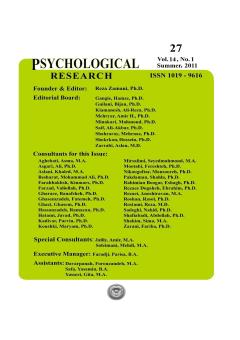Relationship between Hardiness and Parenting Styles among High School Girls of Tehran
Subject Areas : psychology
1 - Islamshahr Islamic Azad University, Iran
Keywords: Hardiness, Parenting,
Abstract :
Abstract: The purpose of this study was to investigate the relationship between hardiness and parenting styles among high school girls in Tehran. A sample consisting of 300 students was selected from Tehran’s high schools through multi-stage (stratified) sampling. Kobasa’s Personal Views Survey, Aspects of Behavior of Parent Questionnaire and a researcher made questionnaire were used for data collection. Data analysis showed a positive and significant relationship between authoritative parenting style and hardiness. However, authoritarian, permissive, and rejective parenting styles showed to have a negative and significant relationship with hardiness. In addition, between commitment and academic achievement there was a positive relationship, however no relationship was found between challenge and control, with academic achievement. Findings also show that students from upper middle class families have a higher tendency to exhibit hardiness.
آرگایل، ام. (1382). روان¬شناسی شادی. ترجمة مسعود گوهری انارکی، حميدطاهر نشاط¬دوست، حسن پالاهنگ، و فاطمه بهرامي. اصفهان: جهاد دانشگاهی واحد اصفهان. (تاریخ انتشار به زبان اصلی 2001).
آریانپور کاشانی، منوچهر (1380). فرهنگ یک جلدی پیشرو آریانپور. تهران: جهان رایانه.
برجعلی، احمد (1378). تأثیر سازگاری و الگوهای فرزندپروری والدین بر تحول روانی ـ اجتماعی دانش¬آموزان دبیرستانی شهر تهران. پایان¬نامه دکتری. تهران: دانشگاه علامه طباطبایی.
بشارت، محمدعلی؛ رضا، پورحسین؛ و کریمی، کیومرث (1384). بررسی تأثیر سخت¬رویی بر سلامت روانی و موفقیت تحصیلی. مجله علوم روانشناختی، 2 و 3، 120-106.
تقی¬زاده، افسانه (1385). بررسی رابطة سخت¬رویی با شیوه¬های فرزندپروری دانشجویان سال اول دانشگاه الزهرا، پایان¬نامه کارشناسی ارشد. تهران: دانشگاه الزهرا.
جمهری، فرهاد (1381). بررسی رابطة بین سخت¬رویی و گرایش به افسردگی و اضطراب بین زنان و مردان دانشجوی دانشگاه¬های تهران. پایان¬نامه دکتری. تهران: دانشگاه علامه طباطبایی.
ساپینگتون، ا. ای. (1384). بهداشت روانی. ترجمه حسین شاهی،. تهران: دوران. (تاریخ انتشار به زبان اصلی 1989).
شارف، آر. اس. (1381). نظریه¬های روان درمانی و مشاوره. ترجمه مهرداد فیروزبخت. تهران: رسا. (تاریخ انتشار به زبان اصلی ندارد).
شعاری¬نژاد، علی¬اکبر (1375). فرهنگ علوم رفتاری. تهران: آزاد.
شولتز، دی. پی. و شولتز، اس. ای. (1379). نظریه¬های شخصیت. ترجمه یحیی سیدمحمدی. تهران: ویرایش. (تاریخ انتشار به زبان اصلی ندارد).
قربانی، نیما (1373). ارتباط سخت¬رویی، الگوی رفتاری تیپ A، و رفتار مستعد بیماری¬های کرونری (تیپ B). پایان¬نامه کارشناسی ارشد. تهران: دانشگاه تربیت مدرس.
کمیجانی، مهرناز (1385). بررسی شیوههای فرزندپروری در بین والدین دارای نوجوانان با اختلال سلوک و والدین دارای نوجوانان عادی. پایان¬نامه دکتری. تهران: دانشگاه آزاد اسلامی، واحد علوم و تحقیقات.
ملک¬مکان، مراد (1378). نگرش مادر نسبت به شیوهای فرزندپروری با یادگیری خودتنظیمی و پیشرفت تحصیلی در دانش¬آموزان سال سوم راهنمایی آباده در سال 77-1376، پایان-نامه کارشناسی ارشد. تهران: دانشگاه تربیت معلم.
نقاشیان، ذبیح¬اله (1358). رابطه جوّ خانواده و پیشرفت تحصیلی. پایان¬نامه کارشناسی. دانشگاه شیراز.
هاک، پل (1380). موفقیت در تربیت فرزندان. ترجمه حسین صیفوریان و محمدطاهر ریاضی ارسی. تهران: رشد. (تاریخ انتشار به زبان اصلی ندارد).
هيبتي، اكرم (1381). بررسي شيوه¬هاي فرزندپروري والدين و رابطه آن با شيوه¬هاي مقابله¬ با استرس دانش¬آموزان. پايان¬نامه كارشناسي ارشد. تهران: دانشگاه تربيت مدرس.
Allen, J. P., & Marsh, L (2002). Longitudinal assessment of autonomy and relatedness in adolescent family interactions as predictors of adolescent self-esteem. Journal of Counseling and Development, 65, 179-194.
Basu, F. (2004). Triple p-positive parenting program: Toward an empirically validated multilevel parenting and family support strategy for the prevention of behavior and emotional problems in children. Journal of Research in Personality, 20, 321-329.
Bernad, J. (2006). Early parent-child relationships and later problem behavior. Journal of Psychology, 11, 412-418.
Bonano, G. A., Gales, S., Bucciareli, A., & Vlahov, D. (2007). What predicts psychological resilience after disaster? The role of demographics, resources, and life stress. Journal of Consulting and Clinical Psychology, 75, 671-682.
Darling, N. (1999). "Parenting style and its correlates" ebesco. http://www.cheathous.com/eview/parentingstyles.
Engles, C. M. (2002). Parenting practices and social skill. Social Behavior & Personality an International Journal, 31, 236-251.
Joanna, B. (2005). The moderating effect of family factors on the delinquency in a sample of male Juvenile offenders. Journal of
Psychology, 14, 117-121.
Kelly, K. (1997). Parenting style and academic outcomes. Journal of experimental education, 14, 123-124.
Longman, M. (2005). Advanced American dictionary. USA: Pearson Longman.
Maddi, S. R. & Kobasa, S. C. (1994). Hardiness and mental health. Journal of Personality Assessment, 63, 264-264.
Masten, A. S. (2006). Resilience in developing system: Progress and promise as the fourth wave rises. Development and Psychopathology, 19, 921-930.
Masten, A. S. (2009). Ordinary magic: Lessons from research on resilience in human development. Education Canada, 49, 28-32.
Obradovic, J. (2006). Competence and resilience in development. Annals of the New York Academy of Sciences, 1094, 13-27.
Sarafino, E. P. (2002). Health psychology-Biopsychosocial interaction (4th). NJ: John Wiley and Sons.
Schnurr, M. (2004). A constructionist discourse on resilience: Multiple realities among at risk children and youth. Society, 35, 341-365.
Seaward, B. L. (1997). Managing stress: Principles and strategies for health and well-being. UK: Jones and Barteit.
Shaffer, D. R. (1996). Development psychology: childhood and adolescence (4th). California: Brolokscola.
Webster-Stratton, C. & Herbert, M. (1995). Treating children with early-onset conduct problems: A comparison of child and parent training interventions. Journal of Consulting and Clinical Psychology, 65, 93- 109.
Weiss, K. & Dennis, M. (2005). Positive emotional and successful adoption with hardiness. Journal of Personality and Social Psychology, 84, 356-360.
William, G., Wiebe, D., & Smith. W. (1992). Coping processes as mediator of the relationship between hardiness and health. Journal of Behavior Medicine, 15, 237-155.


